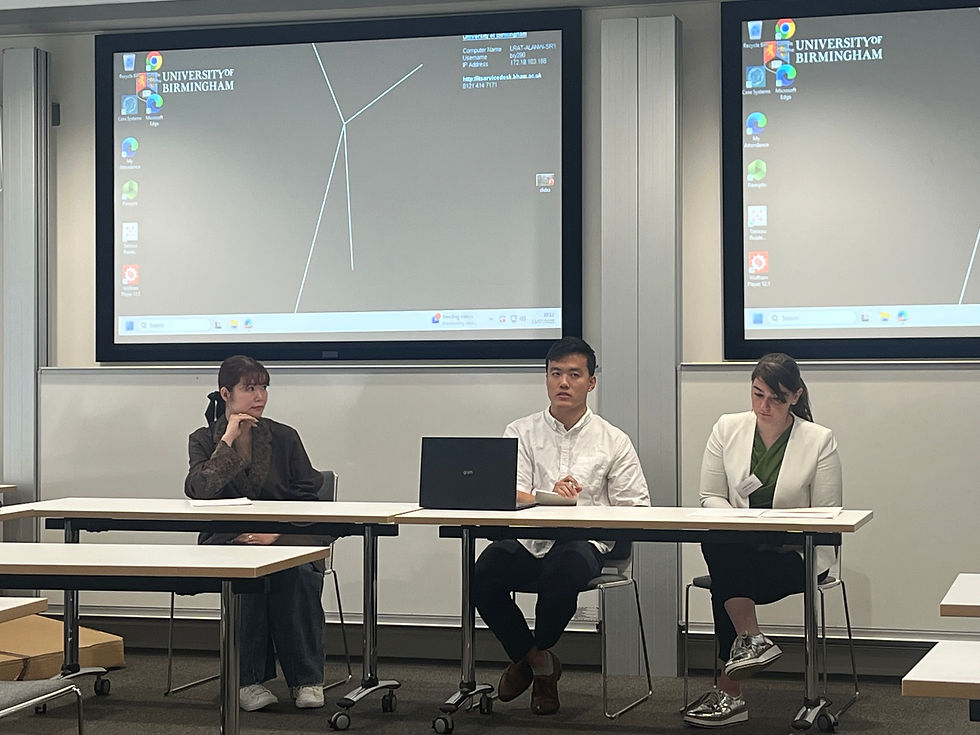SGNCS Members Gather in Birmingham for World Congress: 25 Countries and 5 Continents Represented
- Hakim Towfigh

- Aug 1, 2025
- 4 min read
Updated: Aug 2, 2025

From 17-19 July 2025, delegates from 25 countries on 5 continents gathered at the University of Birmingham for the SGNCS World Congress. The world-class facilities and research environment of the Edgbaston Campus was the backdrop to a series of stimulating events – papers, keynotes, a workshop – on the central theme of “Cultural Circulations, Global Mobilities, and Knowledge Translations: Turning Points in the Nineteenth Century.”
While the congress officially began on 17 July, the SGNCS joined forces with the Victorian Popular Fiction Association a day prior to host a spellbinding magic lantern show presented by renowned performers Jeremy and Carolyn Brooker. In the Charles Dickens Room at the Birmingham & Midland Institute, the Brookers, who are celebrated for their captivating performances, used an authentic triunial (triple) magic lantern -- the rarest and most complex form of this historic visual art – to provide delegates with an unforgettable evening on themes that resonated with both the VPFA and SGNCS conferences.
On the afternoon of 17 July, the congress began with two virtual panels. Delegates were welcomed virtually by Klaudia Lee (City University of Hong Kong), a member of the SGNCS executive council. Later that afternoon, the congress formally began with welcoming remarks by Helen Abbott, Head of the College of Arts and Law and Pro-Vice-Chancellor; Kevin A. Morrison, SGNCS President; Berny Sèbe, SGNCS 2025 World Congress Co-Chair; and Emma Tyler, Head of School of Language, Culture, Art History and Music. The opening keynote was delivered by Professor Charles Forsdick (University of Cambridge), Lead Fellow for Languages at the British Academy and former AHRC Theme Leader for ‘Translating Cultures’. His talk was entitled 'Paying the Price of Freedom: The Cultural Circulation of Haiti in the Nineteenth-Century World'. With the generous support of The School of Languages, Cultures, Art History and Music (LCAHM) at the University of Birmingham, the lecture was open not only to congress delegates but also to academic and students from LCAHM, the College of Arts and Law, which hosted the SGNCS congress, and the broader university community.
The second keynote was delivered by Regenia Gagnier, who holds the Established Chair in English Language and Literature at the University of Exeter, and is founding and co-editor of the Global Circulation Project of Literature Compass. Professor Gagnier's talk was titled “Manik Bandyopadhyay, Technological Progress and Democracy, and the State of Decolonizing.” It approached the long nineteenth century and globalization through key moments in literature, criticism, and theory: the historical novel in its nineteenth-century formation from Walter Scott and its greatest critic Gyorgy Lukacs; the British empire in India and subject formation; the Bangladeshi novelist Manik Bandyopadhyay and his conflict between tradition and modernity; and our current moment of technological globalization.
Dozens of panels explored each of the three key themes: cultural circulations, global mobilities, and knowledge translations. Panels ranged from “Global Circulations of Byron: Revolution and Reaction” and “Japan and Japonisme” to “Nineteenth-Century Tourism and Tourists” and “Periodical Cultures and the Spread of Knowledge” and from “Merchants, Markets, and International Trade” and “Circuits of Knowledge” to “Questions of Space and Place” and “Turning Points in the Balkan Transformation: Unveiling Hidden Episodes of Imperial Rivalries during the late 19th century.” In addition to paper presentations, delegates could also avail themselves of a workshop on “The Nineteenth-Century Global Bookshelf: Methods for Studying Ordinary Readers’ Responses to Translation,” which was facilitated by Alexander Bubb (Roehampton University).
Representatives from Boydell & Brewer and Liverpool University Press were on hand to discuss projects by SGNCS delegates and to showcase recent publications. Liverpool University Press was represented by Christabel Scaife, a Senior Commissioning Editor who acquires monographs and edited collections for the series Studies in the Global Nineteenth Century, published in partnership with the SGNCS. Boydell & Brewer was represented by Katherine Hartle, a commissioning editor with a particular interest in the long nineteenth century. and Crispin Peet, editorial assistant of the modern history list.
As the industrial powerhouse of the industrial revolution in Britain, from where the first intercity railway line ran to London in 1838, Birmingham is a perfect exemplar of the fluxes, trajectories and developments that have shaped the phenomena which SGNCS members engage with in their work. The SGNCS executive council is grateful to the University of Birmingham for hosting us and to the members of two key committees:
World Congress Organising Committee
Berny Sèbe, Co-chair, University of Birmingham
Kevin A. Morrison, Co-chair, Henan University
Nathan Cardon, University of Birmingham
Eleanor Dobson, University of Birmingham
Maddie Hewitson, University of Birmingham
Kate Nichols, University of Birmingham
Emma Tyler, University of Birmingham
Xinbei Wang, University of Birmingham
Tomoki Yamada, University of Birmingham
World Congress Scientific Committee
Walter Bruyère-Ostells, Sciences-Po Aix, France
Rodrigo Escribano Roca, Adolfo Ibáñez University, Chile and CSIC, Spain
Satoshi Mizutani, Doshisha University, Japan
Alexander Morrison, University of Oxford, UK
Almash Seidikenova, Al-Farabi University, Kazakhstan
Gilles Teulié, Aix-Marseille University, France
Jennifer Yee, University of Oxford, UK
Barbara Körte, Albert Ludwigs Universität, Germany
Alex Middleton, University of Oxford, UK
Britta Schilling, Utrecht University, The Netherlands

A selection of photos from the event







Comments